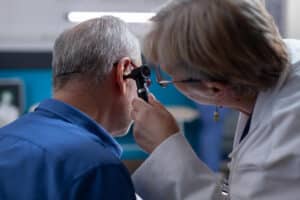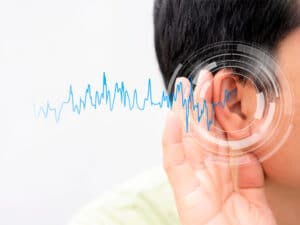Imagine a world without the beautiful melodies of your favorite songs, the joyous laughter of your loved ones, or the soothing sounds of nature. Our ability to hear is a precious gift that enriches our lives in countless ways. Yet, how often do we stop considering the importance of maintaining healthy hearing? Hearing check-ups are not merely reserved for those experiencing signs of hearing loss; they are an essential preventive measure for people of all ages.
From early detection of hearing problems to improving the overall quality of life, these check-ups empower us to take proactive steps in safeguarding our hearing abilities. Our auditory health deserves the same attention and care as any other aspect of our well-being.
Understanding Hearing Check-ups

To truly appreciate the significance of regular hearing check-ups, it’s essential to understand what these assessments entail and how they are conducted. Hearing check-ups, also known as hearing evaluations or screenings, are comprehensive examinations performed by trained professionals, typically audiologists or hearing specialists.
Hearing Check-up Assessments
During a hearing check-up, various tests and assessments are administered to evaluate the health and functionality of your auditory system. These assessments typically include:
- Pure-tone audiometry – This test measures your ability to hear different pitches or frequencies. You will wear headphones and listen to tones at different volumes and frequencies, indicating your hearing thresholds.
- Speech audiometry – This evaluation assesses how well you understand and interpret speech. You will listen to spoken words or sentences at different volumes and repeat them or indicate your understanding.
- Tympanometry – This test examines the movement of your eardrum in response to changes in air pressure. It helps assess the condition of your middle ear and detect any abnormalities, such as fluid accumulation or issues with the Eustachian tube.
- Otoacoustic emissions (OAE) testing – This evaluation measures the sounds produced by the inner ear when stimulated by a sound signal. It helps determine the health of the cochlea, the part of the ear responsible for converting sound vibrations into electrical signals.
- Additional assessments – Depending on your specific needs and symptoms, additional tests may be conducted, such as a middle ear evaluation or a speech-in-noise test to assess your ability to understand speech in noisy environments.
The frequency of hearing check-ups may vary depending on your age, risk factors, and any existing hearing concerns. By undergoing these assessments, you can gain valuable insights into your hearing health, identify any potential issues at an early stage, and take the necessary steps to maintain healthy hearing.
The Benefits of Regular Hearing Check-ups
Regular hearing check-ups offer a multitude of benefits that extend beyond simply assessing our ability to hear. Some of the significant advantages of prioritizing these assessments are:
Early Detection of Hearing Problems
These evaluations can identify signs of hearing loss, tinnitus (ringing in the ears), and other auditory problems at their initial stages. Early detection enables prompt intervention and appropriate treatment, which can prevent further deterioration of hearing abilities and mitigate potential complications.
Improved Quality of Life
Regular check-ups allow us to address hearing problems promptly, enhancing our quality of life. By maintaining healthy hearing, we can actively engage in conversations, enjoy music and other auditory experiences, and fully participate in social and recreational activities. Clear communication and connection with loved ones are vital for emotional well-being and nurturing relationships.
Cognitive Health and Mental Well-being
By detecting and addressing hearing issues through check-ups, we can potentially reduce the risk or slow down the progression of cognitive decline. Furthermore, maintaining healthy hearing promotes mental well-being by reducing feelings of social isolation, anxiety, and depression often associated with untreated hearing loss.
Enhanced Communication and Relationships
Regular hearing check-ups from reputable specialists help ensure that we can hear and understand others accurately. By addressing any hearing difficulties, we can actively participate in conversations, connect with others, and avoid misunderstandings.
Prevention of Further Complications
Regular hearing check-ups enable early identification and intervention, which can help prevent or minimize the development of more severe auditory issues. Timely treatment can potentially prevent the need for more invasive and costly interventions later on.
Financial Benefits of Regular Hearing Check-Ups
While it may seem counterintuitive, regular hearing check-ups can offer financial advantages in the long run. By addressing any hearing issues early on, we can potentially avoid expensive treatments or interventions that may be required if problems are left untreated and allowed to worsen.
Overcoming Barriers to Hearing Check-ups

While the importance of regular hearing check-ups is evident, individuals may still have concerns or misconceptions that prevent them from seeking these valuable assessments. Some common barriers and provide reassurance to overcome them include:
Fear of Diagnosis
Many people hesitate to undergo hearing check-ups due to the fear of receiving a diagnosis of hearing loss or other auditory issues. However, it’s essential to remember that early detection enables timely intervention and treatment, leading to better outcomes.
Discomfort during Tests
Some individuals may worry about the discomfort or invasiveness of the hearing tests in Westchester during a check-up. Rest assured that the majority of these assessments are non-invasive and painless.
Cost Concerns During Hearing Check-Ups
Financial worries can be a significant barrier to seeking hearing check-ups. However, it’s worth considering the potential long-term costs associated with untreated hearing loss.
Lack of Awareness or Importance
Some individuals may underestimate the importance of hearing check-ups or may be unaware of the potential risks of untreated hearing loss. By emphasizing the significance of maintaining healthy hearing and raising awareness about the benefits of regular assessments, more individuals can be motivated to prioritize their auditory well-being.
Accessibility and Availability
Accessibility and convenience may be concerns for some individuals. However, hearing check-ups are available in various settings, including audiology clinics, hospitals, and specialized hearing centers.
It’s important to address these barriers and misconceptions to encourage individuals to prioritize their hearing health. Regular hearing check-ups provide valuable insights into our auditory well-being, allow for early intervention, and can improve overall quality of life.
Tips for Maintaining Healthy Hearing
Preserving healthy hearing is a lifelong endeavor that requires conscious effort and good habits. By incorporating the following tips into your daily routine, you can take proactive steps toward maintaining optimal auditory health.
Protect Your Ears in Noisy Environments
When in loud environments such as concerts, sporting events, or construction sites, wear ear protection, such as earplugs or earmuffs, to reduce the impact of excessive noise. Additionally, consider lowering the volume when using headphones or listening to music through earphones.
Adopt Healthy Listening Habits
When using headphones or earphones, follow the 60/60 rule. Keep the volume at 60% of the maximum level and limit your listening time to a maximum of 60 minutes at a time.
Be Mindful of Everyday Sound
If you encounter sounds that feel uncomfortably loud or cause ringing in your ears, take steps to reduce your exposure. Adjust the volume, move away from the source of noise, or use ear protection when necessary.
Maintain a Healthy Lifestyle
Regular exercise, a balanced diet, and adequate sleep contribute to overall well-being, including auditory health. A healthy lifestyle can improve blood circulation, which is vital for maintaining the health of the delicate structures in your ears.
Avoid the Use of Cotton Swabs
It’s a common misconception that using cotton swabs to clean the ears is necessary for hygiene. However, inserting cotton swabs or any objects into the ear canal can push wax deeper, potentially causing blockages or damage.
Stay Up-to-Date with Hearing Check-ups
Even if you haven’t noticed any specific issues, it’s recommended to undergo a hearing assessment every few years, especially as you age. These check-ups provide early detection of any changes or concerns and allow for timely intervention if needed.
Prioritize Your Hearing Health: Contact Listen Hear Diagnostics Now!

Schedule a hearing check-up with Listen Hear Diagnostics, your leading hearing specialist and audiologist in Westchester. Our dedicated team offers top-notch hearing loss treatment and customized hearing aids in Westchester, NY, to meet your unique needs. Take the first step towards healthy hearing by visiting our website to book your appointment online conveniently. Simply choose a date and time that works best for you.
At Listen Hear Diagnostics, we are committed to providing exceptional care and improving your hearing experience. Don’t delay – contact us now! We look forward to helping you on your journey to optimal auditory health.



